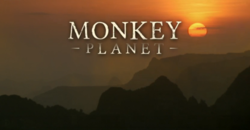| Monkey Planet | |
|---|---|
 | |
| Presented by | George McGavin |
| Theme music composer | Adelphoi Music |
| Country of origin | United Kingdom |
| Original language | English |
| No. of series | 1 |
| No. of episodes | 3 (list of episodes) |
| Production | |
| Executive producer | Chris Cole |
| Producer | Jo Shinner |
| Running time | 60 minutes |
| Production companies | |
| Original release | |
| Network | |
| Release | 2 April – 16 April 2014 |
Monkey Planet is a British documentary television series that was first broadcast on BBC One on 2 April 2014. Presented by George McGavin, the series was produced by the BBC Natural History Unit and Animal Planet. [1]